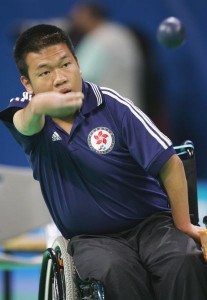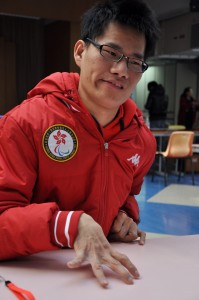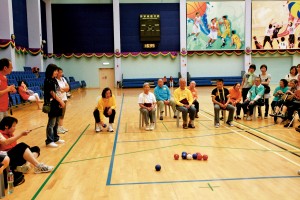A Paralympic sport that everyone can play
by Zoe So

With their sights firmly fixed on a white leather target ball, or jack, the athletes take turns to throw red and blue balls at it. They do so from wheelchairs on an indoor rectangular court. This ball game, which bears a resemblance to petanque and lawn bowls, is called Boccia and has been a Paralympic sport since 1984.
The sport was originally developed for people with cerebral palsy but is now played by people with other disabilities that severely affect motor skills. Athletes can complete in four classes according to their locomotor condition.
Players – or pairs of players in the doubles games – are represented by either red balls or blue balls. They each have six leather balls, which they either throw or use a chute to propel towards the jack. A referee measures the distance of the balls to the jack and the player whose balls are the closet wins the game.
Boccia is a test of nerves, tactics and skill that is now played in more than 50 countries and regions, including Hong Kong. In fact, Hong Kong’s Boccia players have been participating in overseas competitions since 2003 and they have an impressive record in the sport. In the 2008 Paralympics in Beijing, Hong Kong athletes won a gold and a silver.
Leung Yuk-wing is a 29-year-old part-time athlete from the Hong Kong Boccia Team. He has muscular dystrophy and can only play Boccia with his hands. “I love this sport,” says Leung. “When I first came across it in secondary school, I never imagined I could enter the Hong Kong team and enter overseas competitions. I am really delighted!”
Leung and his teammates practise every Tuesday, Thursday and Saturday, for a total of around seven hours per week. Once every two weeks, they also spend eight hours practising on a Sunday. They start off with practising basic skills and moves before having a match.
Leung says that playing Boccia has been beneficial to him. “This makes my character become less impetuous. I was quite stubborn before. The game presents many possibilities and this makes me think twice before making a decision.”

Leung won a gold medal in the 2004 Athens Paralympics and also took part in the 2008 Beijing Paralympics. However, the latter experience was not a happy one. Leung and his teammate lost in the semi-final due to a disputed judgement by the referee. Although they appealed to the organising committee, the result stood.
“After that, I am much more cautious about the score calculation,” Leung says. The incident made him consider giving up Boccia but he eventually decided to carry on because of a goal. “I and my teammate want to win a medal in Paralympics’ pair matches and we have not achieved it yet.”
Despite Hong Kong’s strong standing in Boccia, Leung thinks the territory needs to attract and nurture more young Boccia athletes if it is to remain competitive. He says many parents want their children to study rather than participate in sports, because of the lack of promising career prospects. Balancing studies and sport is a dilemma faced by two younger Boccia athletes who spoke to Varsity and they made different choices.
Yeung Hiu-lam, a 20-year-old paraplegic secondary student, has been a member of the Hong Kong Sports Association for the Physically Disabled (HKSAP) Boccia team since junior form. In 2009, she entered a Boccia juniors’ competition in Tokyo and performed well. However, she put Boccia practice on hold to deal with the Hong Kong Diploma of Secondary Education (HKDSE).
Yeung says she would not consider a career as a Boccia athlete because of the low pay and the short competitive life of an athlete. She will, however, take up playing the game again after she completes her public examinations because practising Boccia makes her healthier.
“I have wanted to be a social worker since I was a child. If I get good results in HKDSE then I can enter university. If not, I will go to Hong Kong Institute of Vocational Education (IVE) then follow that path,” she says.
Another athlete, Wong Kam-lung, made a different decision. Wong has muscular dystrophy and plays Boccia using his legs. In 2012, he decided to postpone taking his HKDSE and repeat his studies for a year so he could compete in the London Paralympics.
Wong says Boccia is the best sport for him considering his physical condition. He says it is simple to learn but difficult to master. “I can teach you how to play Boccia in 15 minutes but it is difficult for you to learn how to control the force and direction [of the ball],” he says.
Wong is not just skilled at playing the game, he is also resourceful. Most of the leather ball sets are imported and can be quite expensive. Therefore, he came up with an idea to produce handmade Boccia leather balls using leather cut up from old sofas. Wong’s younger brother helped him to cut up and sew the balls and when they became more skilled, they bought pieces of leather to make more balls. These homemade balls look very similar to the imported ones. “It is still in a research and development stage,” Wong says proudly of his masterpiece.
Apart from new blood, Boccia athletes say there needs to be more places for them to practice if the sport is to continue to thrive. “This sport does not require a lot of equipment, but it needs quite a lot of space. I can say that the availability is definitely inadequate,” Wong says.
Leung Yuk-wing agrees. At present, Boccia players have to improvise on non-purpose-built courts. Leung says they need to make preparations before they practise. “In order to save time, we use some recyclable materials…like ribbons, to make a V shape and baselines then I and my teammates can use the baselines of the badminton courts,” he says.
Leung is glad there will be a new Boccia court at the Hong Kong Sports Institute, which will provide athletes with a regular place to practise in the future.

Apart from being a sport for the disabled Boccia is also a sport that can be played by mixed ability teams and by the elderly. Rosa Mah Yuk-han, a physiotherapist working for the Helping Hand group, which works with the elderly, has helped to organise Boccia activities for the elderly since 2004. Ten years ago, she was sponsored by the Hong Kong Sports Association for the Physically Disabled to take a referee training course in New Zealand.
Boccia as a recreational activity for the elderly began as a programme covering 12 elderly homes and care centres in Kwai Ching. Since then it has developed into a programme involving around 400 centres across the territory.
Mah says that, initially, in order to attract the attention of the elderly, they made the activities like carnivals with booth games, cheerleader teams, body checks and gifts. They even invited actor Alex Fong Lik-sun as a guest.
Nurses in the elderly centres teach the elderly how to play the game and they hold regular practices. Mah says playing Boccia helps elderly people to keep their minds sharp and develop strength in their hands and waists.
“It is quite interesting. I move more, move my hands and legs. At the time [of the competition] I played several times a week. I just play it when I am free,” says elderly participant Lin Heung.
Although Boccia has been going strong among the elderly for a decade now, Mah finds she is still holding training courses for nurses and social workers because there is such a high turnover of care staff. In addition to holding training sessions, Mah and her colleagues at Helping Hand have written a training handbook for newcomers. She hopes the programme can continue every year but says its scale depends on funding.
Many sports require a certain level of physical fitness which may not be possessed by everyone. Boccia, as both a competitive sport and a recreational activity has been a success in Hong Kong. And with the World Boccia Championships to be staged in Beijing later this year, followed by the Asian Para Games in Incheon, Korea, it is a good time for the general public to know more about the sport.
Edited by Joyce Cheng











































